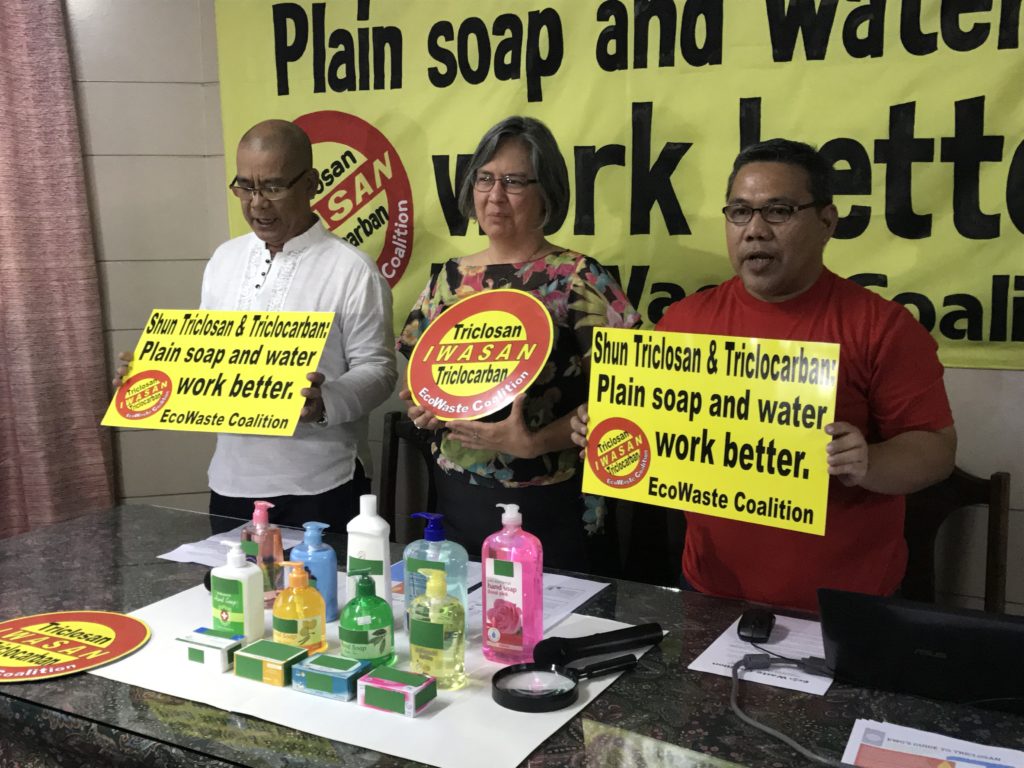Should you be wary of ‘anti-bacterial’ soap?

Environmentalist Rene Pineda, public health expert Dr. Ann Blake and Ecowaste project coordinator Thony Dizon urge consumers to stop using products with anti-bacterial additives triclosan and triclocarban. Photo by Kristine Angeli Sabillo/INQUIRER.net
A public health expert and an environmental group warned Filipinos against buying products with “anti-bacterial” ingredients.
Ecowaste Coalition and California-based Dr. Ann Blake told media on Tuesday that studies have indicated increased evidence of health and environmental harm due to the use of antibacterial soaps and washes with triclosan and triclocarban.
READ: Antibacterial soap no real threat to germs—study
Triclosan and triclocarban are among the 19 antibacterial additives that will be banned by the US Food and Drug Administration (FDA) in over-the-counter soaps by September this year.
They are widely used in locally distributed soaps and washes.
Antibiotic resistance
Blake, who has a Ph.D. in molecular genetics and neural development from the University of Oregon, explained that thechemicals were originally used as medical disinfectants but have been added to personal care and household cleaning products.
“These are much stronger than we ever need,” she said during a press conference in Quezon City. She explained that companies often market such products as an effective way to protect people from diseases and “superbugs.”
However, it instead strips away “good bacteria” from the body while contributing to “antibiotic resistance.” She said people are also exposed to livestock dosed with antibiotics, which is unnecessary if the animals were kept in sanitary conditions.
Environmental hazard
She warned that antibiotics from these soaps and those from the industrial meat sector end up in the sewage.
“They don’t get caught in water treatment systems so they go to bio-sewage or sewage sludge. And a lot of that get spread on food land as fertilizer, which makes a perfect opportunity for low levels of antibacterials to be exposed to sunlight and break down to dioxin and furans, which are the most potent man-made carcinogens known,” Blake explained.
She added that triclosan can exist for about a year while triclocarban can last much longer in the environment.
Meanwhile Rene Pineda of Ecowaste Coalition said such chemicals are toxic to aquatic organisms. The accumulation of such antibacterials in water bodies “affect the balance of the fragile marine ecosystems and result in hazardous residues in fish that we eat,” he said.
Health risks
Blake further warned that such additives can cause irritation of the skin and eyes and problems in the respiratory system. It can cause asthma and weaken a person’s immune system.
Blake said that studies have monitored high concentration of the man-made antibacterials in the human body specifically in blood, breastmilk and urine because of the increasing use of triclosan and triclocarban.
“Ecowaste coalition would like to government to take a look at this issue very, very seriously,” Pineda said.
He said consumers should also be informed and become aware that they are paying extra for “something unnecessary.
Instead, Pineda advised consumers to “go back to being simple” by using organic and natural products such as coconut-based soaps.
“Our coconut oil has very much antibacterial properties that can rid our surroundings and ourselves with undesirable bacteria,” he said.
Blake and Pineda acknowledged that some multinational companies have already discontinued the use of triclosan and triclocarban because of recent studies and the FDA ban. However, some companies can divert their products to Asia once the ban is enforced in the US.
Pineda urged people to call for regional regulation against the antibacterial additives, especially since Asia is the world’s “largest consuming region” and “largest marine food producer.”
Ecowaste last week conducted test buys of antibacterial soaps and washes at local stores and “found many products listing triclosan or triclocarban among their ingredients.”
Blake said the easiest way to deal with the problem is to stop buying such products. “That will send a message (to the manufacturers),” she said. IDL














